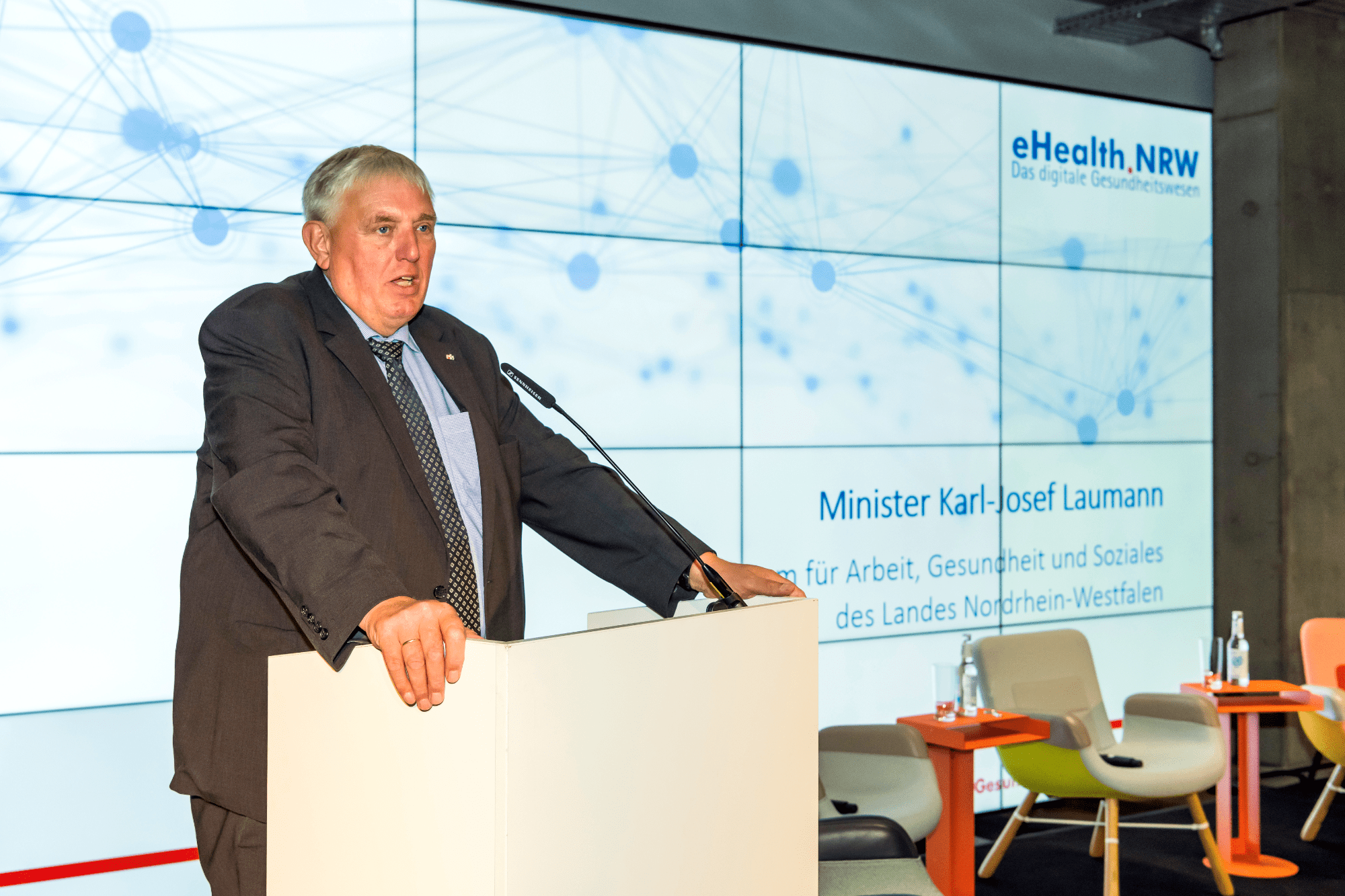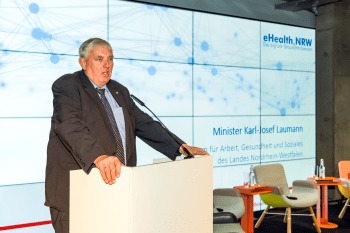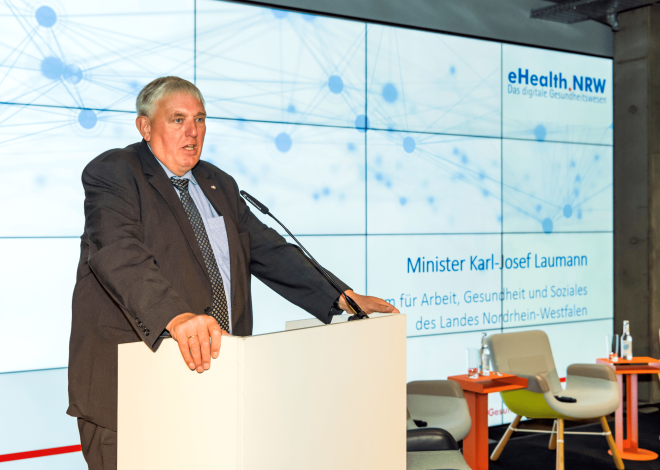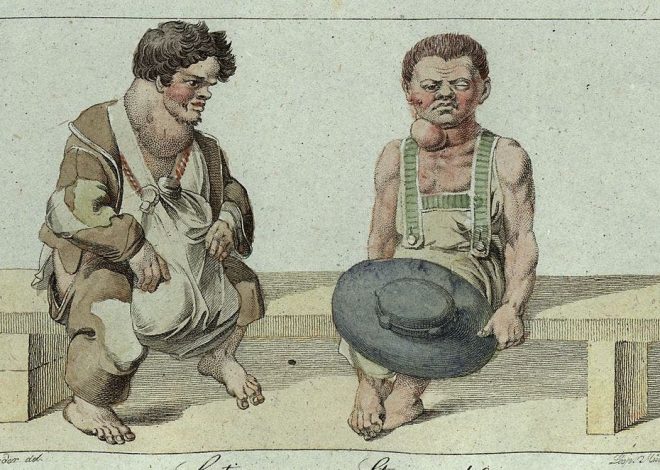
With digital medicine to the health system of the future
eHealth.NRW Congress brings telemedicine to life
October 5, 2023
Real patient journeys and stories were the focus of the program at this year’s “eHealth.NRW” congress on September 27, 2023. The congress was organized by the ZTG Center for Telematics and Telemedicine GmbH in cooperation with the Ministry of Labor, Health and Social Affairs of North Rhine-Westphalia in Düsseldorf. Under the motto “Towards the health region of the future with digital medicine”, experts, interested parties and decision-makers from the healthcare sector discussed digital developments in North Rhine-Westphalia. Karl-Josef Laumann, Minister for Labor, Health and Social Affairs of North Rhine-Westphalia, opened the congress and visited the accompanying exhibition “Patient Stories”, in which treating physicians and patients reported on their experiences with telemedicine.

“In North Rhine-Westphalia we are working intensively to ensure that digitalization also advances in the healthcare system for the benefit of citizens. Digital networking is an important component in ensuring optimal health care in our country in the future,” explained Minister Laumann at the start of the event. “I spoke personally with some patients at the congress today. They all impressively reported how the use of telemedicine helped them with their treatment. Let’s use the wide-ranging know-how from North Rhine-Westphalia to advance digitalization in our state and, above all, to bring it to the people.”
Health region of the future: How exactly?
This question started the first round of discussion. Video consultations, electronic patient files, e-prescriptions, wearables, digital health applications (DiGA) – a wide range of digital applications with opportunities for care. Telemedicine is omnipresent, explained Christian Wehner, Head of Health Management, AOK Rheinland/Hamburg. Digital elements are now integrated into a large number of the projects that AOK supports. “Only if we manage to integrate digital offerings such as telemedicine into physical care processes and structures can we create networked health regions that ensure good quality care and access to it for the population,” says Wehner.
Not a replacement, but a useful addition: Digital medicine is playing an increasingly important role in the regional design of healthcare. It is important to link telemedicine and direct personal medicine – across sector boundaries. And that is exactly what health regions are needed for, according to the unanimous plea of the discussants. However, you shouldn’t just think spatially. City or district: size is not important. Rather, we need doctor networks. The outpatient colleagues need to know what the hospital did before and vice versa. “Regional care then offers those involved the opportunity to tap into care potential through targeted coordination,” explained Thomas Müller, board member of the Westphalia-Lippe Association of Statutory Health Insurance Physicians (KVWL) and member of the ZTG supervisory board.
Experience telemedicine through real patient stories
Both in the program and in the accompanying exhibition, practitioners and patients reported on their experiences with telemedicine applications in the care areas of sleep apnea, pediatrics, heart failure, dementia and stroke prevention.
In the specific case of a heart failure patient from the “HeartConnect” program of the Heart and Diabetes Center NRW, daily blood pressure monitoring enables much more precise therapy control – the pumping function and the performance of the heart improved and are now stable. Dr. Christian Flottmann presented the “smartcor” app, which enables digital prevention with modern smartwatch technology. The relative of a person suffering from dementia reported on the digital H3 training (heart, hand, brain) from the Hamm Telemedicine Center – a playful activation program that combines cognitive stimulation therapy with digital brain performance training. Her husband’s cognitive abilities improved. Bernhard Acke, deputy head of the eHealth department at the North Rhine Association of Statutory Health Insurance Physicians, and Edwin Ackermann, pediatrician and adolescent doctor, also described how the use of video consultations in the pediatric emergency service last winter made a significant contribution to relieving the burden on practices in the North Rhine region. A sleep apnea patient also reported how he could be helped using telemedicine. The direct added value of digitalization is particularly evident in the interaction of individual digital applications, such as video consultations, telemonitoring or a teleconsultation.
Higher quality of treatment, exchange of knowledge, direct involvement of the patient in the treatment process and time savings: a win for everyone involved.
Let’s get it done!
Actually simple, but still worth discussing. Bringing all of these good approaches into the field requires good cooperation from all sides – and the willingness to think beyond project boundaries. Lars Ehm, head of the health care, prevention, digitalization of medical care group in the Ministry of Labor, Health and Social Affairs of North Rhine-Westphalia, gave an overview of initiatives from North Rhine-Westphalia. To name just a selection: teleemergency doctor, virtual hospital, the innovation fund project Optimal@NRW. Ehm praised the good approaches and called for people to apply for the current ERDF funding phase.
Afterwards, Dr. med. Heinz-Wilhelm Esser (Doc Esser from WDR) made a burning plea for the electronic patient file and in the following discussion round focused, in addition to the ongoing interface problems, on how patients’ trust in the digitalization of care can be strengthened. “We have to make the benefits of telemedicine clear to them,” explained Barbara Steffens, head of the TK state representative in North Rhine-Westphalia. “Then our patients will also want to take advantage of the offer. And we need to be more open about the use of health data. In all other areas we disclose our data very freely. Data protection is important, but many multimorbid patients would certainly opt for a more open exchange of data between those treating them if it promised tangible added value for their care.”
Christiane Grote, Head of the Health and Care Market Group, Consumer Center North Rhine-Westphalia e. V., added: “From a consumer protection perspective, the digitalization of health and care can improve medical care. This requires user-friendly structures and secure data exchange. And of course, doctors and patients must be able to use telemedical devices.”
Trust, information, digital competence and transparency – important success factors for digitalization. In addition, interoperability is still a big problem in Germany, complained the discussants. Systems must interconnect. In addition to the many points already mentioned, this is a crucial step in driving digitalization forward. “There is definitely still a lot to do,” emphasized ZTG managing director Rainer Beckers at the end of the congress. “All healthcare stakeholders can participate in this process so that we can find each other and understand each other’s perspectives. With eHealth.NRW we offer an invitation to exchange ideas, which was again very well received this year.”
Would you like to see the congress yourself? You can access the recording here: eHealth.NRW Congress – YouTube

Ethel Purdy – Medical Blogger & Pharmacist
Bridging the world of wellness and science, Ethel Purdy is a professional voice in healthcare with a passion for sharing knowledge. At 36, she stands at the confluence of medical expertise and the written word, holding a pharmacy degree acquired under the rigorous education systems of Germany and Estonia.
Her pursuit of medicine was fueled by a desire to understand the intricacies of human health and to contribute to the community’s understanding of it. Transitioning seamlessly into the realm of blogging, Ethel has found a platform to demystify complex medical concepts for the everyday reader.
Ethel’s commitment to the world of medicine extends beyond her professional life into a personal commitment to health and wellness. Her hobbies reflect this dedication, often involving research on the latest medical advances, participating in wellness communities, and exploring the vast and varied dimensions of health.
Join Ethel as she distills her pharmaceutical knowledge into accessible wisdom, fostering an environment where science meets lifestyle and everyone is invited to learn. Whether you’re looking for insights into the latest health trends or trustworthy medical advice, Ethel’s blog is your gateway to the nexus of healthcare and daily living.


